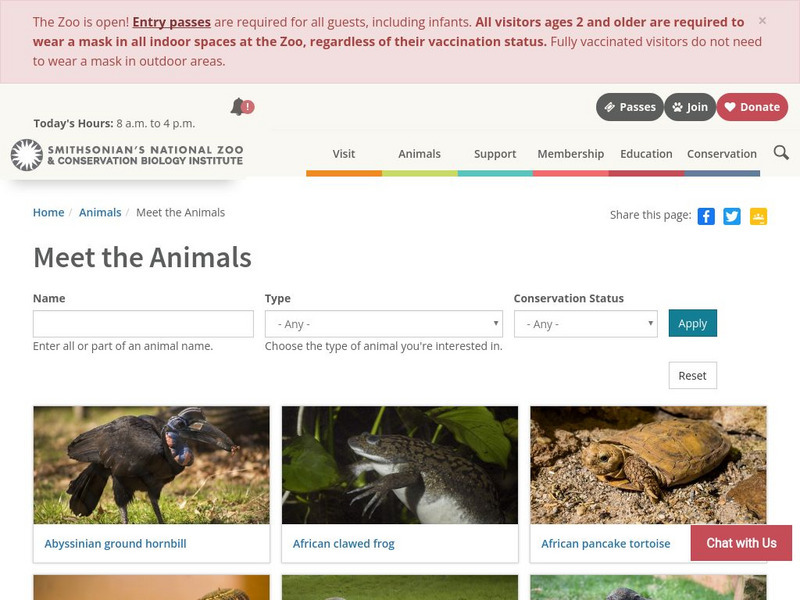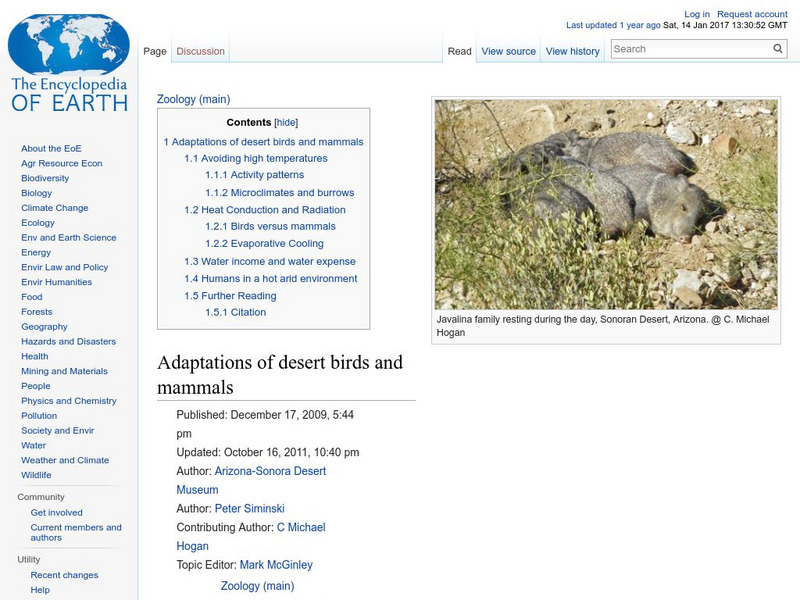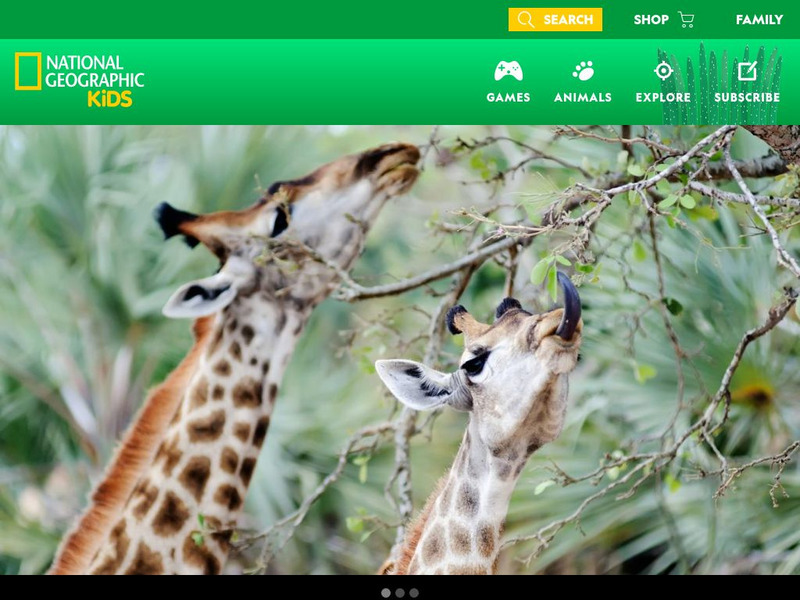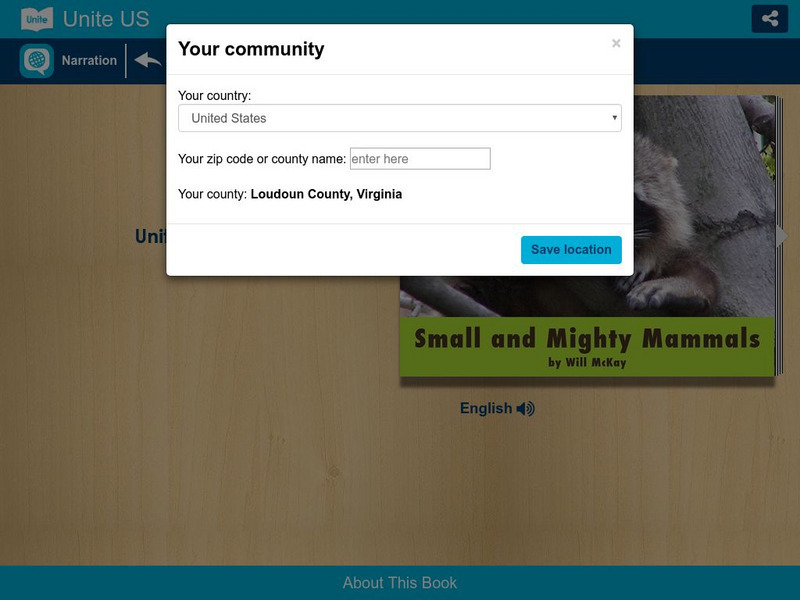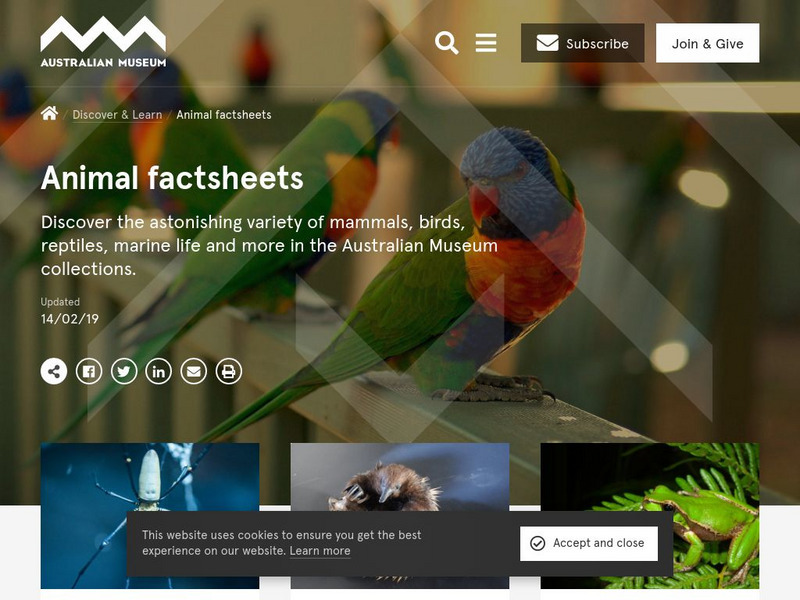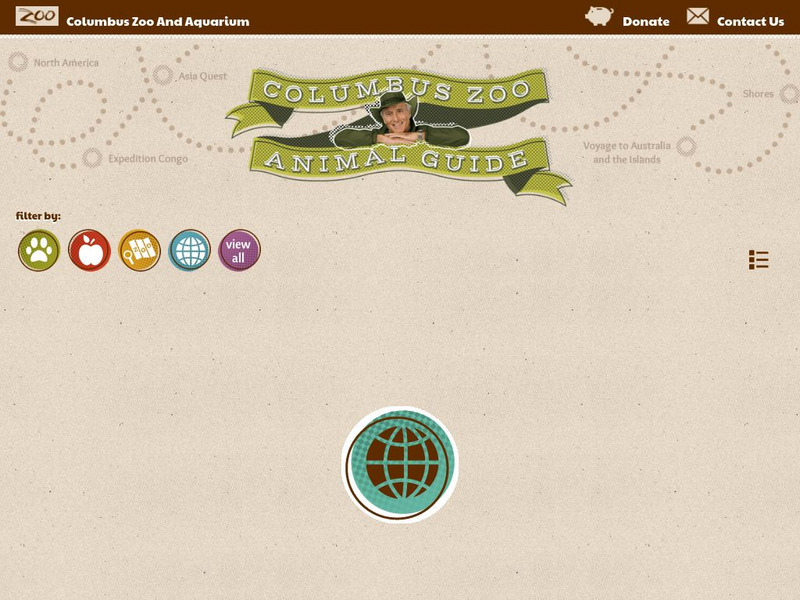BBC
Bbc Science & Nature: The Life of Mammals
Students can watch vivid pictures change before their eyes, from lions to monkeys to dolphins. Authors provide interactive games that aid in learning the behavior of animals. Continue to explore by investigating the habitat, diet, and...
Smithsonian Institution
Smithsonian National Zoo: Small Mammals
The Smithsonian National Zoological Park explores the lives of small mammals, both in the wild and in captivity. Choose a webcam to view a variety of small mammals live and up-close, learn about current conservation efforts, access an...
Other
Science4 Us: Animals
In online and offline activities, students broaden their understanding of animals by learning to identify and classify animals into six categories: mammals, birds, fish, amphibians, reptiles, and invertebrates.
Curated OER
National Park Service: Arches National Park: Animals
A resource where you'll learn about amphibians, birds, mammals, and reptiles at Arches National Park in Moab, Utah. A good look at how animals live, sleep, eat, and stay active in a desert habitat.
University of Florida
Florida Museum of Natural History: Animals 1: Fur, Fins, Feathers, and More
This teacher's guide focuses on familiar animals such as mammals, birds, reptiles, amphibians, and fish.
Smithsonian Institution
Smithsonian National Zoo: Animals at the Zoo From a to Z.
Get information about a variety of mammals using this online alphabetical index. Information includes facts about their classification, habitat, diet, behavior and conservation status.
Encyclopedia of Earth
Encyclopedia of Earth: Adaptations of Desert Birds and Mammals
The ways in which animals have adapted so as to survive in a desert environment are described in this article. Mechanisms that humans have to help them cool themselves in a desert are also explained. (Published: December 17, 2009)
Encyclopedia of Life
Encyclopedia of Life: Mammals
Thorough reference tool explores mammals with a description, pictures, and maps. Includes facts on ecology, behavior, habitat, conservation, and external links.
National Geographic Kids
National Geographic Kids: Animals: Blue Whales
Do you know that the blue whale is the largest animal to ever live on Earth? Take an exciting look at this mammal with easy to read facts including habitat, appearance, young, mating, diet, enemies, as well as colorful photos. Links to...
National Geographic Kids
National Geographic Kids: Animals: Orangutans
This multimedia site includes video and audio clips. The maps and fun facts will be very beneficial to students doing research projects.
National Geographic Kids
National Geographic Kids: Animals: Giraffes
This multi-media National Geographic site includes video and audio clips and fun facts all about giraffes. Students can even send a postcard to a friend.
Unite for Literacy
Unite for Literacy: Animals: Small and Mighty Mammals
Learn about some of the special skills some small mammals have. Includes audio narration in Turkish and English, with text in English.
National Geographic Kids
National Geographic Kids: Animals: Koala
"Koalas are marsupials, related to kangaroos." Fun facts, video and audio clips make this a great National Geographic site for student research projects.
PBS
Pbs Learning Media: Jaws and Teeth of Mammals
This image from Biology by Kenneth R. Miller and Joseph Levine illustrates the relationship between structure and function by comparing the jaws and teeth of two animals with very different ways of life: the wolf and the horse.
National Geographic Kids
National Geographic Kids: Animals: Bactrian Camel
Great site for youngers researching the Bactrian camel. Video clip, photos, and easy to read facts about habitat, young, enemies, food, adaptation to environment, and humps!
Australian Museum
Australian Museum: Animals
This online site for the Australian Museum introduces the nature and culture of this unique continent. This particular section focuses on the creatures of Australia including spiders, fish, birds, reptiles, mammals, insects, frogs,...
Other
The Animals Page
Provides an easy to understand overview of animals from protozoa and echinoderms to insects, mammals, birds, and fish.
Missouri Botanical Garden
Missouri Botanical Garden: Tundra Animals
Explore this comprehensive resource on the birds and mammals of the tundra. This resource features information such as diet, class, order, size, habitat, conservation range and the like.
CK-12 Foundation
Ck 12: Life Science: Importance of Mammals
[Free Registration/Login may be required to access all resource tools.] Mammals play many important roles in ecosystems, and they also benefit people. Learn more about the importance of mammals in this learning module produced by CK-12.
Other
Ladywildlife's How Mammals Move
Discusses the different ways mammals move. Also presents some key facts about some unique mammals and how they move.
Other
Columbus Zoo and Aquarium: Mammals
This interactive animal guide from the Columbus Zoo highlights general information and fun facts about mammals; this information can be sorted by diet or region where they live. Select an animal from the extensive list to begin exploring.
A-Z Animals
A Z Animals: Animal Facts: Masked Palm Civet (Paguma Larvata)
Investigate the world of the Masked Palm Civet and discover information on the appearance, habitat, and conservation status of this Asian jungle mammal. Includes an image and statistics.
CK-12 Foundation
Ck 12: Biology: Mammal Ancestors
[Free Registration/Login may be required to access all resource tools.] Discusses therapsid ancestors of mammals.
American Museum of Natural History
American Museum of Natural History: Exhibition: Extreme Mammals
Learn about the body structure, habitat, reproduction, movement, and evolution of extreme mammals, both extinct and living, through interative animation and short videos.
Other popular searches
- Classify Animals and Mammals
- Australian Animals Mammals
- Science Animals Mammals
- Animals Mammals Activities
- Animals Mammals Reproduction







